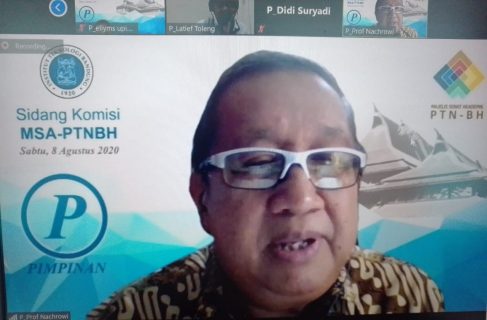MSA-PTNBH Commission Session, Nachrowi: Beware of Increased Dropouts and Lower Competence of Graduates Due to the Covid-19 Pandemic
DEPOK – (8/8/2020) The Academic Senate of the Bandung Institute of Technology held a virtual Legal Entity State University Senate Council Commission Session (MSA-PTNBH), with the theme “New Academic Norms Facing the New World Order”, on Saturday (8 / 8/2020).
This session was attended by more than 150 participants from the Academic Senate from 11 PTN-BH whose members include UI, IPB, ITB, UNPAD, UPI, UGM, UNDIP, ITS, UNAIR, USU, and UNHAS.
MSA-PTNBH regularly holds meetings to discuss the dynamics of academic norms in tertiary institutions, conveys experiences from each university, and formulates input to the government about improving the quality of learning in higher education.
In his speech, Prof. Nachrowi Djalal Nachrowi, Ph.D., Chairperson of the Academic Senate Council of 11 Legal State Universities as well as Professor of FEB UI, said that since the beginning of March 2020, there have been extraordinary developments in Indonesia, namely the outbreak of a pandemic that overturned all of the established orders of life, including the teaching-learning process in higher education.

Even so, the teaching and learning process in higher education cannot stop even if it has to be carried out online. The changing pattern of teaching from offline to online is suddenly one of the lessons of this pandemic. Like it or not, lecturers are forced to be able to conduct lectures online from their respective homes and students are also forced to be able to attend online lectures from their respective homes or hometowns.
In general, the Covid-19 pandemic forces humans to change their behavior in order to adapt to the new life order. Humans are forced to behave cleanly, work from home, able to aintain safe distancing from one another, and be able to limit social activities that result in crowds. As a result, activities that require physical presence are disrupted. Then, economic activities that require the presence of buyers and sellers are obstructed. Furthermore, production activities that require the presence of workers to operate machinery in factories are also disrupted, and so on.
As a result, world economic activity has not only slowed down but has actually stalled. Almost all countries in the world experienced negative growth or contracted in the second quarter of this year. As an illustration of how badly this pandemic has devastated the world economy, let’s take a look at the economic growth figures since the outbreak. France contracted -19%, the UK -17.9%, Germany -11.7%, the US -9.5%. Industrial countries in Europe and America had their economies collapsing and suffered terribly. Our neighbor Malaysia is contracting at -8.4% and Indonesia is at -5.32%. Only China still grew by 3.2%.
So, what is the impact of this pandemic on the world of education in general, and higher education in particular in Indonesia. Because the educational process in tertiary institutions still requires the physical presence of students, lecturers, educators on campus, and the presence of researchers in laboratories. There is also still a need for the presence of medical, dental, and nursing students to practice in hospitals. So the activities of the learning process in higher education are not spared from this pandemic. Therefore, the teaching-learning process in higher education needs to be adjusted to a new order that is able to coexist in a healthy manner with Covid-19.
Unfortunately, according to epidemiologists, we will still live side by side with Covid-19 at least until the end of this year. This means that the majority of the teaching and learning process will still be carried out from their respective homes until the end of the year. This means we still need to make adjustments to learning patterns in campus in this pandemic era.
Therefore, universities must be able to change the behavior of their students and change the behavior of other academicians in order to be able to adopt a culture, such as being clean, not clustered and healthy so that the immune system is always prime.
These new cultural issues in higher education management need to be accommodated in the New Academic Norms and become one of the main topics of our discussion this morning. The most important thing that we need to anticipate is the phenomenon of the decline in the financial capacity of the parents of students due to the global economic downturn. As a consequence, the ability of parents to pay for their children’s college education will decline. This can result in an increase in the drop-out rate at colleges and a decrease in higher education revenue. As a result, universities need to accommodate this possibility in the new academic norm.
Another thing that we need to be aware of in this pandemic era is the decline in the quality of learning due to online learning. We need to admit that the online learning process is not as effective as the face-to-face learning process. Often our students who attend lectures from the regions complain that the internet connection is not reliable, so the knowledge transfer process is not perfect. In addition, there are other limitations in the way online lectures can hinder the transfer of knowledge from lecturers to students. We need to look at this fact and we need to look at how to increase the effectiveness of this online learning process.
(am)



